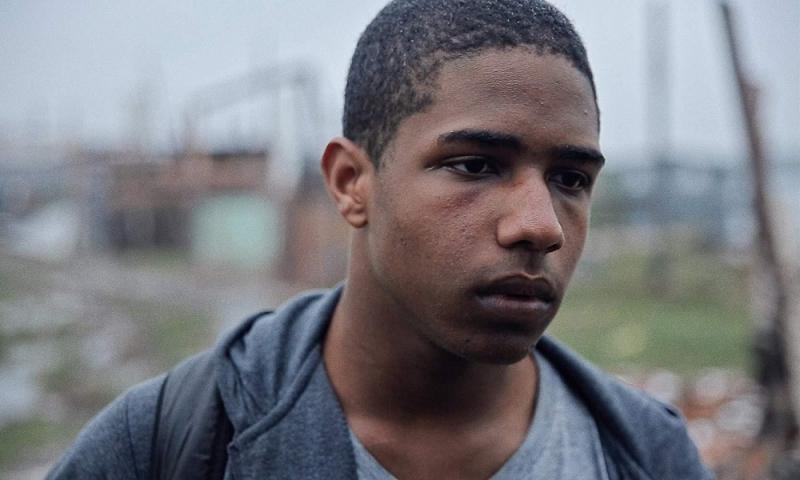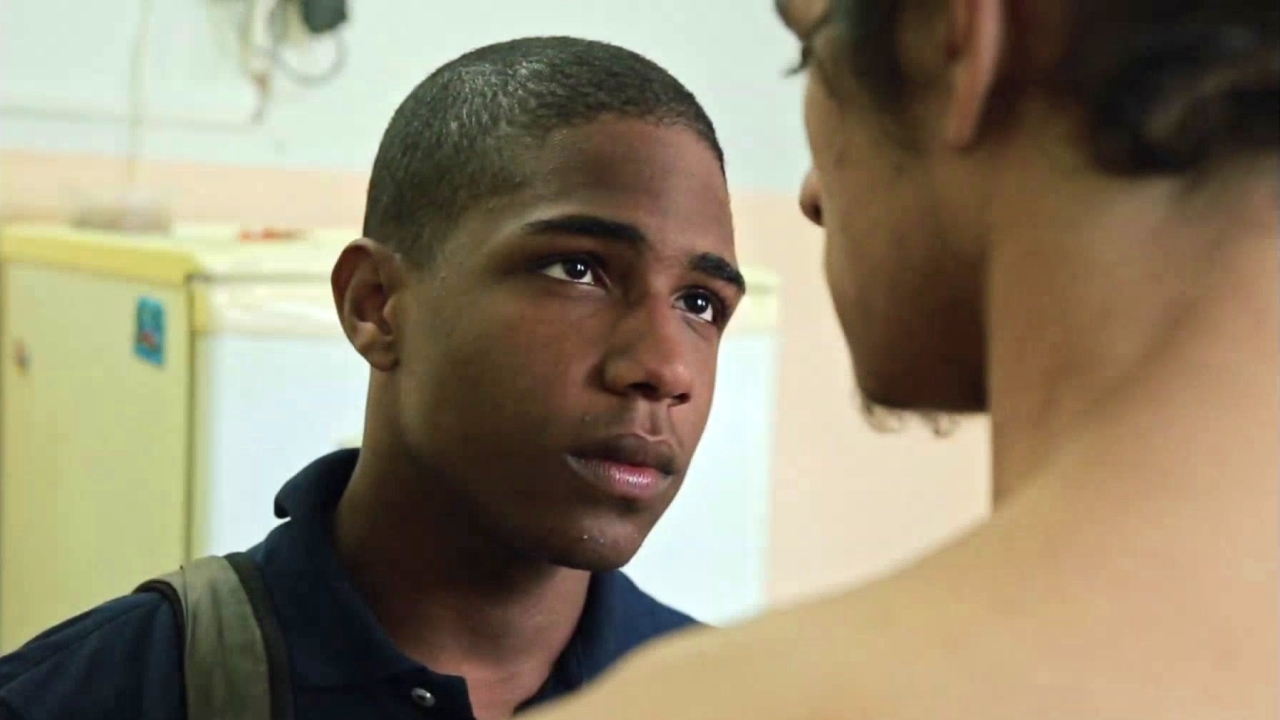Sócrates review - pain and grief on the Brazilian coast | reviews, news & interviews
Sócrates review - pain and grief on the Brazilian coast
Sócrates review - pain and grief on the Brazilian coast
A remarkable performance from Christian Malheiros elevates this short slice-of-life study

In the course of this short (65 minute) film, 15-year-old Sócrates wanders around Santos, in the state of Brazil’s São Paolo, and the nearby coast after the death of his mother, rejected at one point or another by everyone with whom he comes in contact, just as he rejects the worst options.
The harsh lessons here are no doubt true to life: the film was made by Alexandre Moratto with the co-operation of 16 to 20 year olds from the Baixada Santista district (to be precise, it is advertised as "the first feature produced by the Querô Institute in Brazil where it was co-written, produced, and acted by at-risk teenagers from local low-income communities, with the support of UNICEF").
It rings true that Sócrates is only tolerated where he can pay, with the exception of a shop where he’s made 20 copies of the resumé he hopes to give out for employment, and the owner lets him off a dollar, and that the brief, potentially loving relationship he forms with the troubled Maicon (Tales Ordakji, pictured below with Malheiros) can’t last in such a society (you think a gay love story is going to form the backbone of the film, but – spoiler notice – it’s just one passing episode in a general drama of pain).  There’s poetic economy in the images of the two things that let Sócrates hold on to his dead mother – the comb with hair in it, the ashes over which his feckless father has control. Nature breaking through the wastelands is captured by fine cinematography, and the boy’s face is tragic dignity personified. If there's any optimism, it's in his pride that refuses to succumb to a care home or intolerable life with a homophobic father.
There’s poetic economy in the images of the two things that let Sócrates hold on to his dead mother – the comb with hair in it, the ashes over which his feckless father has control. Nature breaking through the wastelands is captured by fine cinematography, and the boy’s face is tragic dignity personified. If there's any optimism, it's in his pride that refuses to succumb to a care home or intolerable life with a homophobic father.
Dialogue remains spare throughout, often only hinting at context – maybe all we need to know about Sócrates’s name is that it came from his mother (presumably in honour of the Brazilian footballer, not the Greek philosopher) – and raising more questions than it answers: what happened to school (registered work isn't an option as he's underage), and what’s the nature of the father’s apparently oppressive religion? The music, too, is low level and unobtrusive. Yet you feel it could all have been a bit more fleshed out, leavened by a dash or two of humour, and what the viewer takes away is little more than the memory of a face in grief and anguish.
- In cinemas and on DVD now
- More film reviews on theartsdesk
The future of Arts Journalism
You can stop theartsdesk.com closing!
We urgently need financing to survive. Our fundraising drive has thus far raised £49,000 but we need to reach £100,000 or we will be forced to close. Please contribute here: https://gofund.me/c3f6033d
And if you can forward this information to anyone who might assist, we’d be grateful.

Subscribe to theartsdesk.com
Thank you for continuing to read our work on theartsdesk.com. For unlimited access to every article in its entirety, including our archive of more than 15,000 pieces, we're asking for £5 per month or £40 per year. We feel it's a very good deal, and hope you do too.
To take a subscription now simply click here.
And if you're looking for that extra gift for a friend or family member, why not treat them to a theartsdesk.com gift subscription?
more Film
 Bugonia review - Yorgos Lanthimos on aliens, bees and conspiracy theories
Emma Stone and Jesse Plemons excel in a marvellously deranged black comedy
Bugonia review - Yorgos Lanthimos on aliens, bees and conspiracy theories
Emma Stone and Jesse Plemons excel in a marvellously deranged black comedy
 theartsdesk Q&A: director Kelly Reichardt on 'The Mastermind' and reliving the 1970s
The independent filmmaker discusses her intimate heist movie
theartsdesk Q&A: director Kelly Reichardt on 'The Mastermind' and reliving the 1970s
The independent filmmaker discusses her intimate heist movie
 Blu-ray: Wendy and Lucy
Down-and-out in rural Oregon: Kelly Reichardt's third feature packs a huge punch
Blu-ray: Wendy and Lucy
Down-and-out in rural Oregon: Kelly Reichardt's third feature packs a huge punch
 The Mastermind review - another slim but nourishing slice of Americana from Kelly Reichardt
Josh O'Connor is perfect casting as a cocky middle-class American adrift in the 1970s
The Mastermind review - another slim but nourishing slice of Americana from Kelly Reichardt
Josh O'Connor is perfect casting as a cocky middle-class American adrift in the 1970s
 Springsteen: Deliver Me From Nowhere review - the story of the Boss who isn't boss of his own head
A brooding trip on the Bruce Springsteen highway of hard knocks
Springsteen: Deliver Me From Nowhere review - the story of the Boss who isn't boss of his own head
A brooding trip on the Bruce Springsteen highway of hard knocks
 The Perfect Neighbor, Netflix review - Florida found-footage documentary is a harrowing watch
Sundance winner chronicles a death that should have been prevented
The Perfect Neighbor, Netflix review - Florida found-footage documentary is a harrowing watch
Sundance winner chronicles a death that should have been prevented
 Blu-ray: Le Quai des Brumes
Love twinkles in the gloom of Marcel Carné’s fogbound French poetic realist classic
Blu-ray: Le Quai des Brumes
Love twinkles in the gloom of Marcel Carné’s fogbound French poetic realist classic
 Frankenstein review - the Prometheus of the charnel house
Guillermo del Toro is fitfully inspired, but often lost in long-held ambitions
Frankenstein review - the Prometheus of the charnel house
Guillermo del Toro is fitfully inspired, but often lost in long-held ambitions
 London Film Festival 2025 - a Korean masterclass in black comedy and a Camus classic effectively realised
New films from Park Chan-wook, Gianfranco Rosi, François Ozon, Ildikó Enyedi and more
London Film Festival 2025 - a Korean masterclass in black comedy and a Camus classic effectively realised
New films from Park Chan-wook, Gianfranco Rosi, François Ozon, Ildikó Enyedi and more
 After the Hunt review - muddled #MeToo provocation
Julia Roberts excels despite misfiring drama
After the Hunt review - muddled #MeToo provocation
Julia Roberts excels despite misfiring drama
 London Film Festival 2025 - Bradley Cooper channels John Bishop, the Boss goes to Nebraska, and a French pandemic
... not to mention Kristen Stewart's directing debut and a punchy prison drama
London Film Festival 2025 - Bradley Cooper channels John Bishop, the Boss goes to Nebraska, and a French pandemic
... not to mention Kristen Stewart's directing debut and a punchy prison drama
 Ballad of a Small Player review - Colin Farrell's all in as a gambler down on his luck
Conclave director Edward Berger swaps the Vatican for Asia's sin city
Ballad of a Small Player review - Colin Farrell's all in as a gambler down on his luck
Conclave director Edward Berger swaps the Vatican for Asia's sin city

Add comment